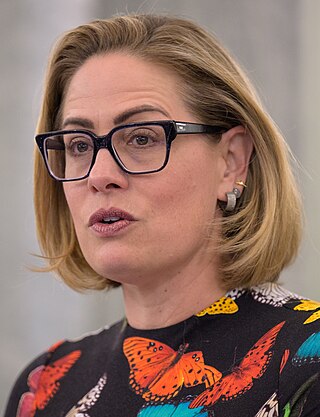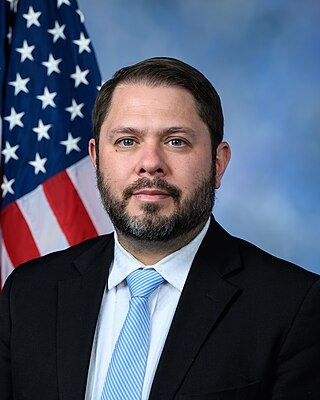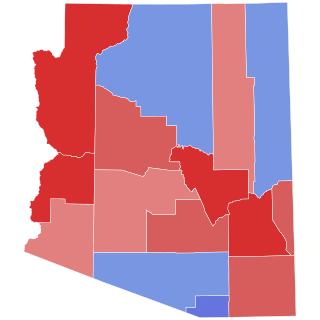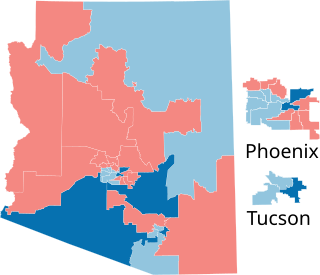
Since Arizona became a U.S. state in 1912, it has sent congressional delegations to the United States Senate and United States House of Representatives, beginning with the 63rd United States Congress in 1913. Before becoming a state, the Arizona Territory elected a non-voting delegate at-large to Congress from 1864 to 1912. Each state elects two senators to serve for six years, and varying numbers of members of the House, depending on state population, to two-year terms. Arizona has sent nine members to the House in each delegation since the 2010 United States Census.
This article covers the history of women in the United States Senate and various milestones achieved by female senators. It includes a list of all women who have served in the Senate, a list of current female senators, and a list of states represented by women in the Senate. The first female U.S. senator, Rebecca Latimer Felton, represented Georgia for a single day in 1922, and the first woman elected to the Senate, Hattie Caraway, was elected from Arkansas in 1932. Since its establishment in 1789, 60 women have served in the upper house of the United States Congress. As of October 3, 2023, there are 25 women serving as U.S. senators out of 100 possible seats. Additionally, Kamala Harris as vice president serves as President of the Senate.
In U.S. politics, an independent Democrat is an individual who loosely identifies with the ideals of the Democratic Party but chooses not to be a formal member of the party or is denied the Democratic nomination in a caucus or primary election. Independent Democrat is not a political party. Several elected officials, including members of Congress, have identified as independent Democrats.

Kyrsten Lea Sinema is an American politician and former social worker serving as the senior United States senator from Arizona, a seat she has held since 2019. A former member of the Democratic Party, Sinema became an independent in December 2022.

Rubén Marinelarena Gallego is an American politician and U.S. Marine Corps veteran serving as the U.S. representative for Arizona's 3rd congressional district. Gallego served and deployed as a USMCR corporal in the US invasion of Iraq. He is a member of the Democratic Party.

The 2012 United States House of Representatives elections in Arizona were held on Tuesday, November 6, 2012, to elect the nine U.S. representatives from the state, one from each of the state's nine congressional districts, including the newly created 9th district following the 2010 United States census. The elections coincided with other federal and state elections, including a quadrennial presidential election, and a U.S. Senate election. Primary elections were held on August 28, 2012.

Gregory John Stanton is an American lawyer and politician who is the U.S. representative from Arizona's 4th congressional district, serving since 2019. A Democrat, he was previously mayor of Phoenix from 2012 to 2018, and was on the Phoenix City Council from 2000 until 2009.

Lela Alston is an American politician and a Democratic member of the Arizona State Senate representing District 5 since January 9, 2023. She previously represented District 24 from 2019 to 2023, and served in the Arizona House of Representatives from 2013 to 2019, and from 2011 to 2013 in the District 11 seat, and non-consecutively in the Arizona State Legislature from 1977 until 1995 in the Arizona Senate.

The 2020 United States Senate elections were held on November 3, 2020, with the 33 class 2 seats of the Senate contested in regular elections. Of these, 21 were held by Republicans, and 12 by Democrats. The winners were elected to 6-year terms from January 3, 2021, to January 3, 2027. Two special elections for seats held by Republicans were also held in conjunction with the general elections: one in Arizona, to fill the vacancy created by John McCain's death in 2018; and one in Georgia, following Johnny Isakson's resignation in 2019. These elections ran concurrently with the 2020 United States presidential election in which incumbent president Donald Trump lost to Democratic nominee Joe Biden.

The 2018 United States Senate election in Arizona took place on November 6, 2018. Incumbent Republican Senator Jeff Flake did not seek reelection to a second term. The election was held concurrently with a gubernatorial election, other elections to the U.S. Senate, elections to the U.S. House of Representatives, and various other state and local elections.

The 2018 Arizona gubernatorial election took place on November 6, 2018, to elect the Governor of Arizona, concurrently with the election of Arizona's Class I U.S. Senate seat, as well as other elections to the United States Senate in other states and elections to the United States House of Representatives and various state and local elections.

The 2020 United States Senate special election in Arizona was held on November 3, 2020, following the death in office of incumbent Republican U.S. Senator John McCain on August 25, 2018. Governor Doug Ducey was required by Arizona law to appoint a Republican to fill the vacant seat until a special election winner could be sworn in. On September 5, 2018, Ducey appointed former U.S. Senator Jon Kyl to fill McCain's seat. However, Kyl announced he would resign on December 31, 2018.

The 2024 United States Senate elections are scheduled to be held on November 5, 2024, as part of the 2024 United States elections. Thirty-three of the 100 seats in the U.S. Senate will be contested in regular elections. Senators are divided into three classes whose six-year terms are staggered so that a different class is elected every two years. Class 1 senators will face election in 2024.

The 2024 United States Senate election in Arizona will be held on November 5, 2024, to elect a member of the United States Senate to represent the state of Arizona. Democratic congressman Ruben Gallego and Republican former news anchor Kari Lake are seeking their first term in office. The winner will succeed independent incumbent Kyrsten Sinema, who is not seeking re-election after one term.

The 2010 Arizona Senate election was held on November 2, 2010. Voters elected members of the Arizona Senate in all 30 of the state's legislative districts to serve a two-year term. Primary elections were held on August 24, 2010.

The 2012 Arizona Senate election was held on November 6, 2012. Voters elected members of the Arizona Senate in all 30 of the state's legislative districts to serve a two-year term. These were the first elections following the 2010 redistricting cycle. Since passage of Proposition 106 in 2000, redistricting in Arizona is done by the Arizona Independent Redistricting Commission (AIRC). Following redistricting, many incumbents were moved into new districts. Primary elections were held on August 28, 2012.

The 2024 Arizona elections will be held in the state of Arizona on November 5, 2024, coinciding with the nationwide general election. One of the state's U.S. Senate seats will be up for election, as will all nine of its seats in the U.S. House and three of the five seats on the Arizona Corporation Commission.

The 2002 Arizona House of Representatives election took place on Tuesday, November 5, 2002, with the primary election held on Tuesday, September 10, 2002. Arizona voters elected all 60 members of the Arizona House of Representatives in multi-member districts to serve two-year terms.














